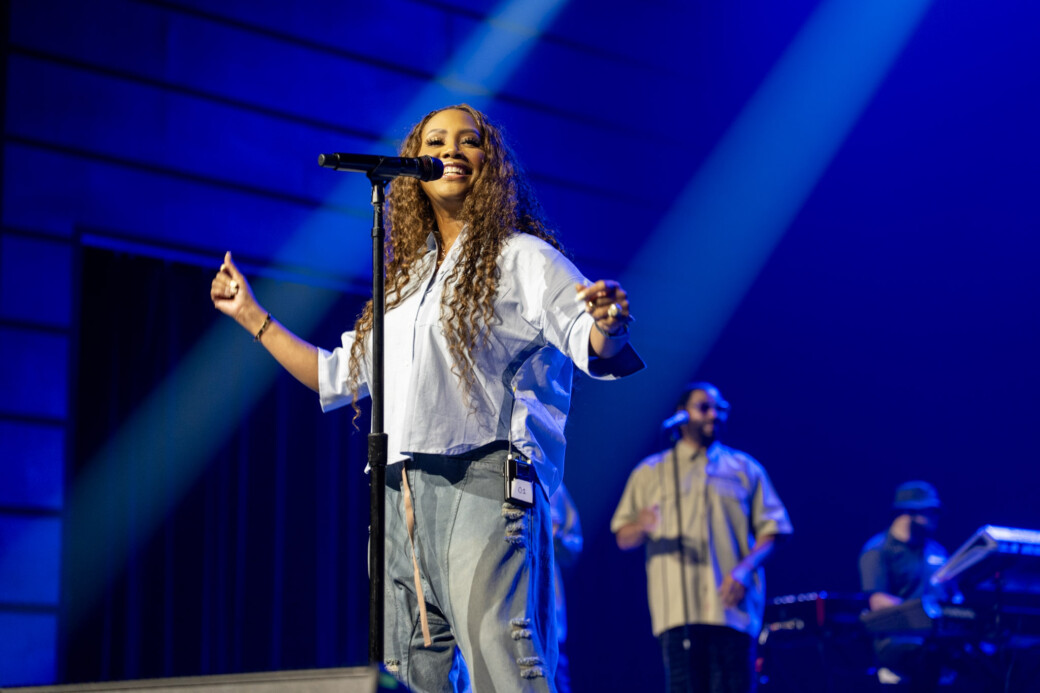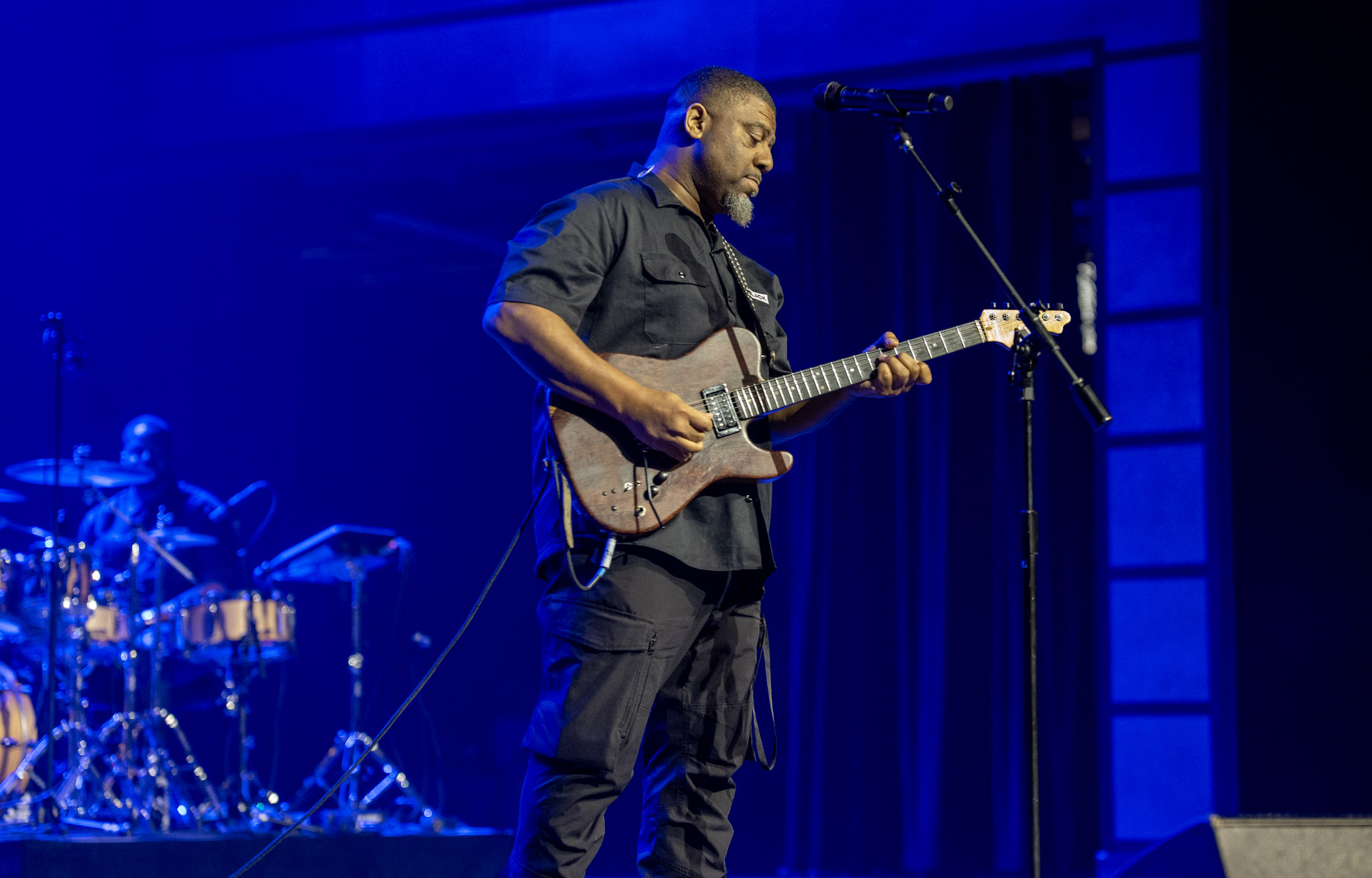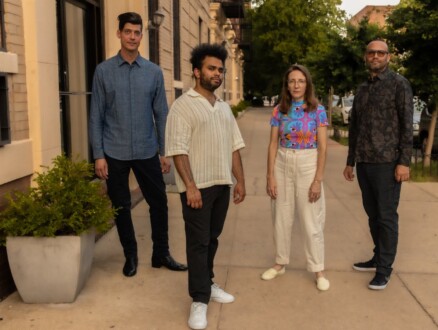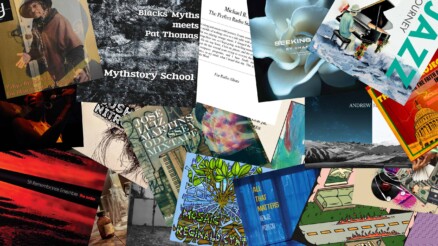Yours Sincerely, Lalah Hathaway

Lalah Hathaway
The Anthem
Friday, August 29, 2025
Lalah Hathaway wants everything vantablack — blacker than black, the blackest black, a black that reveals Hathaway’s genealogical relationship to sound, traceable to her father Donny Hathaway’s performance of “Be Real Black For Me.” Yet, being really Black is not the narrowness of negation, it is also a recognition that Blackness can hold every other color, can include every other possibility.
In Song of Solomon, Toni Morrison’s Pilate Dead reminds us:
There’re five or six kinds of black. Some silky, some woolly. Some just empty. Some like fingers. And it don’t stay still. It moves and changes from one kind of black to another. Saying something is pitch black is like saying something is green. What kind of green? Green like my bottles? Green like a grasshopper? Green like a cucumber, lettuce, or green like the sky is just before it breaks loose to storm? Well, night black is the same way. May as well be a rainbow.
Lalah Hathaway’s sound emanates from a Black space that absorbs every color and encases every other tonal register we find in the range of the rainbow.
For the jazz world, Hathaway’s appearance on Snarky Puppy’s live-recorded Family Dinner – Volume One — performing Hathaway’s original “Something” — was a revelation. It opened a new vista for what the voice might do, leaving listeners wondering if she had, in fact, just sang a chord. Absorbing every other color can produce a new sound, just as it produces a new color. It was a moment she later attributed to her capacity to never lose her own wonder. But even as that chord carried with it an entire history of Black soundmaking, Hathaway has always been after more.
Born to singers Donny and Eulalah Hathaway, she was trained as a jazz vocalist and pianist at Berklee College of Music. Her alma mater recently awarded her an honorary doctorate, during which she reminded the graduates that even in an industry that labels and categorizes everything, it is only your relationship to the art that will make you “the greatest of all time.” As she embraced and then discarded expectations of herself that she brought to Berklee, she would learn that a better path was available: “Doing what she wanted.” Or, being sincere.
We think we know what a jazz singer ought to be. And Hathaway explodes that assumption in order to do something else, to sing draped in vantablack.
Yet, she is also interested in us, a form of concern which comes through in her stage presence. But in her recent appearance at the Anthem as part of the DC Jazz Festival, we had to wait a bit for that moment. Surprisingly, Hathaway ceded the first thirty minutes of her set to Oakland-based guitarist Jubu Smith and his band Legally Blynd. The band — sans-Hathaway — made its entrance via the Blues before ending up deep in the soul of Black music with covers of Tony! Toni! Toné!’s “Anniversary” and Frankie Beverly & Maze’s “Golden Time of the Day” (both of whom Smith had toured with for years).
Joining Jubu was his brother Eric Smith on bass, alongside Hathaway’s regular touring unit which includes drummer Varo Johnson and pianist Eriane Tucker, both hailing from her native Chicago. For those who may not have known Jubu Smith’s name, the familiarity of his extended guitar riffs were an unmistakable reminder of the sound he brought as a session artist for some of the most famous R&B, fusion and funk recordings of the last two generations. At the Anthem, Smith introduced many to his vocals for the first time as well.
This unexpected set was the perfect foil for Hathaway’s entrance into the space.

The Blues roots were apparent in Smith’s sound. Roots were also relevant for Hathaway, who reminded us that D.C. was the city where her parents met while students at Howard University. A city — Hathaway also acknowledged — under siege, as the National Guard patrolled just outside the venue. But instead of centering the discomfiting presence of fascism, she chose to insist on her Blackness as presence and grounding for the set, which opened with an intro sequence from Vantablack (her latest album) that repeated the words, “I love being Black,” before going into “Higher” from her 2017 record, Honestly.
Much like her parents, who while attending Howard were forced into a categorical box called “classical music,” Hathaway’s sound has broken free from a classical training that might have become restrained and policed by the expectations of genre. But there was still an ethos of control. A natural contralto, Hathaway’s home in the lower registers became the privileged mode of address as she ran through cuts from Vantablack and the old familiars of her repertoire which included her hits like the Joe Sample composition “When Your Life Was Low,” “Forever, For Always, For Love” and “I’m Coming Back,” alongside a powerful medley of some of Anita Baker’s most famous songs.
During the performance of “I’m Coming Back” — a heartfelt ballad from her eponymous debut record that tries to sound what it means to experience and desire actual commitment — the crowd suddenly went silent. The interplay of the song’s thesis with the give-and-take between Hathaway and background vocalists Kalo King and Jason Morales modeled the practice of commitment on stage, taking us all to a deeply solemn place. It happened again when she and Smith sang a duet version of Legally Blynd’s “You.” Then with the Baker medley, Hathaway had the rhythm section stay in the same space as she sang the melody of four different songs while Smith riffed over top.
This is the kind of inventiveness and subtlety one might learn to incorporate from “jazz” performance.
Still, over the course of the 90-minute set, Hathaway was not out to “prove” her vocal range, though there were occasional inflections and bursts of powerful energy that produced higher tones. It was the careful and intentional placement and the seeming ease through which she situated and arranged those moments that stood out. This alone might have satisfied the palate. But just as you settled in, out of nowhere would come fits of improvisation, replete with the Blues language we call scatting. It was as if she was saying to the packed house who knew who she was, that there was still just a little more to her. She was telling us about her tradition without selling it to us. As she ended the set with an up-tempo number entitled “So In Love” and the title track from Vantablack, it was also as if she was saying: Being real Black, for me, is still enough.
No one else sounds like this. Although we all play an individual part in the chorus of humanity, no one else has made sound sound this way. No one has made the blood memory bequeathed to us move that way. For this is a sound that relates to jazz academy training more sincerely, than authentically. In his ethnography of Harlem, Real Black, anthropologist John L. Jackson offers a useful distinction between the two: “Questions of sincerity imply social interlocutors who presume one another’s humanity, interiority, and subjectivity. It is a subject-subject interaction, not the subject-object model that authenticity presumes.”
From Hathaway’s pitch Black, we are moved to a different set of expectations for not only what a jazz-trained singer might be, but for what radically honest music can and should offer to us rather than to some objective abstraction we might call “jazz.” One might even say that we are moved closer to a relation to ourselves and a responsibility for each other in light of a sound that is sincerely Black. A sound that is yours sincerely.
Before we knew it, our breath was taken away. The audience’s familiarity with the music did not prevent the novelty of performance from taking over. Hathaway was casual, yet serious in her intention to let her vocals become a vessel to do the work, to open up the space for the spirit to move, for the improvisatory moment to offer a connection to us. The voice as first instrument, as Hathaway collaborator Rachelle Ferrell once made famous, is the foundation for this first daughter of soul. Which means it must also have been the foundation for a Blues people who knew that our individual souls drenched in love was a “subversive gift” for people thought to have nothing else.
When Roberta Flack and Donny Hathaway sang “I (Who Have Nothing)” we knew that nothingness was not nothing. It is the same when Lalah Hathaway sings. It is the same when she honored her father at Anthem with her rendition of “Love, Love, Love.” It became clearer in that moment that mimicry or imitation was not the route toward repetition and remembering. The path back to ourselves was paved through sincerity.





